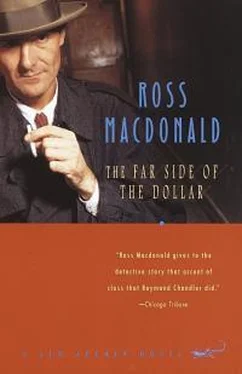“Ten of them. Take your pick.”
“How much?”
“Depends on if you rent by the day or the week. They’re three-fifty a day, sixteen a week.”
“I’d better check with the Browns first, see if they’re planning to stay.”
“I wouldn’t know about that. They been here three weeks.”
He had a flexible worried mouth in conflict with a stupid stubborn chin. He stroked his chin as if to educate it. “I can let you have number eight for twelve a week single. That’s right next door to the Browns’ place.”
“I’ll check with them.”
“I don’t believe they’re there. You can always try.”
I went outside and down the dreary line of cottages. The door of number seven was locked. Nobody answered my repeated rapping.
When I turned away, the old man was standing in front of number eight. He beckoned to me and opened the door with a flourish: “Take a look. I can let you have it for ten if you really like it.”
I stepped inside. The room was cold and cheerless. The inside walls were concrete block, and the same unnatural green as the outside. Through a crack in the drawn blind, yellow light slashed at the hollow bed, the threadbare carpet. I’d spent too many nights in places like it to want to spend another.
“It’s clean,” the old man said.
“I’m sure it is, Mr. Dack.”
“I cleaned it myself. But I’m not Dack, I’m Stanislaus. Dack sold out to me years ago. I just never got around to having the signs changed. What’s the use? They’ll be tearing everything down and putting up high-rise apartments pretty soon.”
He smiled and stroked his bald skull as if it was a kind of golden egg. “Well, you want the cottage?”
“It really depends on Brown’s plans.”
“If I was you,” he said, “I wouldn’t let too much depend on him.”
“How is that, Mr. Stanislaus?”
“He’s kind of a blowtop, ain’t he? I mean, the way he treats that little blonde wife. I always say these things are between a man and his wife. But it rankles me,” he said. “I got a deep respect for women.”
“So have I. I’ve never liked the way he treated women.”
“I’m glad to hear that. A man should treat his wife with love and friendship. I lost my own wife several years ago, and I know what I’m talking about. I tried to tell him that, he told me to mind my own business. I know he’s a friend of yours–”
“He’s not exactly a friend. Is he getting worse?”
“Depends what you mean, worse. This very day he was slapping her around. I felt like kicking him out of my place. Only, how would that help her? And all she did was make a little phone call. He tries to keep her cooped up like she was in jail.”
He paused, listening, as if the word jail had associations for him. “How long have you known this Brown?”
“Not so long,” I said vaguely. “I ran into him in Los Angeles.”
“In Hollywood?”
“Yeah. In Hollywood.”
“Is it true she was in the movies? She mentioned one day she used to be in the movies. He told her to shut up.”
“Their marriage seems to be deteriorating.”
“You can say that again.”
He leaned toward me in the doorway. “I bet you she’s the one you’re interested in. I see a lot of couples, one way and another, and I’m willing to bet you she’s just about had her fill of him. If I was a young fellow like you, I’d be tempted to make her an offer.”
He nudged me; the friction seemed to warm him. “She’s a red-hot little bundle.”
“I’m not young enough.”
“Sure you are.”
He handled my arm, and chuckled. “It’s true she likes’em young. I been seeing her off and on with a teenager, even.”
I produced the photograph of Tom that Elaine Hillman had given me. “This one?”
The old man lifted it to the daylight, at arm’s length. “Yeah. That’s a mighty good picture of him. He’s a good-looking boy.”
He handed the photograph back to me, and fondled his chin. “How do you come to have a picture of him?”
I told him the truth, or part of it: “He’s a runaway from a boarding school. I’m a private detective representing the school.”
The moist gleam of lechery faded out of Stanislaus’s eyes. Something bleaker took its place, a fantasy of punishment perhaps. His whole face underwent a transformation, like quick-setting concrete.
“You can’t make me responsible for what the renters do.”
“Nobody said I could.”
He didn’t seem to hear me. “Let’s see that picture again.”
I showed it to him. He shook his head over it. “I made a mistake. My eyes ain’t what they used to be. I never seen him before.”
“You made a positive identification.”
“I take it back. You were talking to me under false pretenses, trying to suck me in and get something on me. Well, you got nothing on me. It’s been tried before,” he said darkly. “And you can march yourself off my property.”
“Aren’t you going to rent me the cottage?”
He hesitated a moment, saying a silent goodbye to the ten dollars. “No sir, I want no spies and peepers in my place.”
“You may be harboring something worse.”
I think he suspected it, and the suspicion was the source of his anger.
“I’ll take my chances. Now you git. If you’re not off my property in one minute, I’m going to call the sheriff.”
That was the last thing I wanted. I’d already done enough to endanger the ransom payment and Tom’s return. I got.
A BLUE SPORTS car stood in the drive behind the Hillman Cadillac. An athletic-looking young man who looked as if he belonged in the sports car came out of the house and confronted me on the front steps. He wore an Ivy League suit and had an alligator coat slung over his arm and hand, with something bulky and gun-shaped under it.
“Point that thing away from me. I’m not armed.”
“I w-want to know who you are.”
He had a faint stammer.
“Lew Archer. Who are you?”
“I’m Dick Leandro.”
He spoke the words almost questioningly, as if he didn’t quite know what it meant to be Dick Leandro.
“Lower that gun,” I reminded him. “Try pointing it at your leg.”
He dropped his arm. The alligator coat slid off it, onto the flagstone steps, and I saw that he was holding a heavy old revolver. He picked up the coat and looked at me in a rather confused way. He was a handsome boy in his early twenties, with brown eyes and dark curly hair. A certain little dancing light in his eyes told me that he was aware of being handsome.
“Since you’re here,” I said, “I take it the money’s here, too.”
“Yes. I brought it out from the office several hours ago.”
“Has Hillman been given instructions for delivering it?”
He shook his head. “We’re still waiting.”
I found Ralph and Elaine Hillman in the downstairs room where the telephone was. They were sitting close together as if for warmth, on a chesterfield near the front window. The waiting had aged them both.
The evening light fell like gray paint across their faces. She was knitting something out of red wool. Her hands moved rapidly and precisely as if they had independent life.
Hillman got to his feet. He had been holding a newspaper-wrapped parcel in his lap, and he laid it down on the chesterfield, gently, like a father handling an infant.
“Hello, Archer,” he said in a monotone. I moved toward him with some idea of comforting him. But the expression in his eyes, hurt and proud and lonely, discouraged me from touching him or saying anything very personal.
“You’ve had a long hard day.”
He nodded slowly, once. His wife let out a sound like a dry sob. “Why haven’t we heard anything from that man?”
Читать дальше












